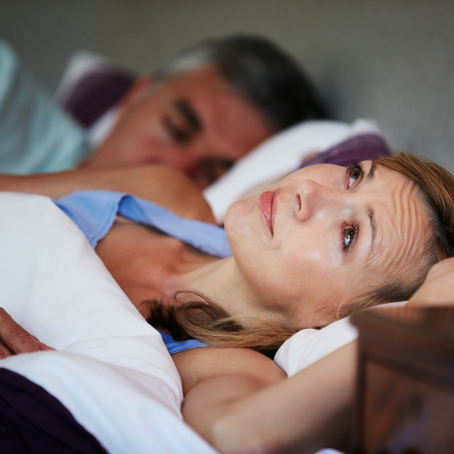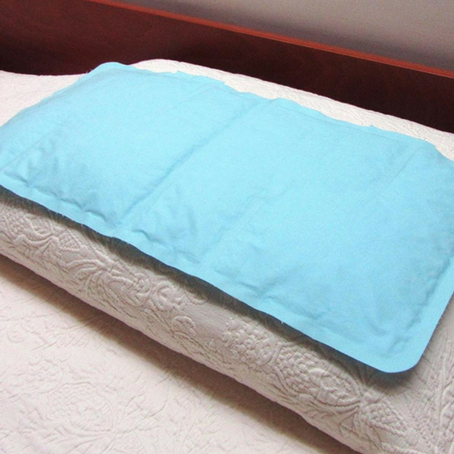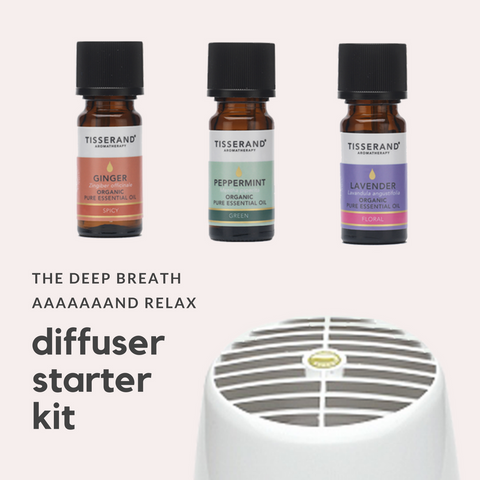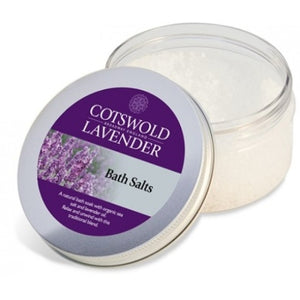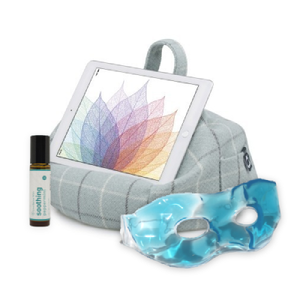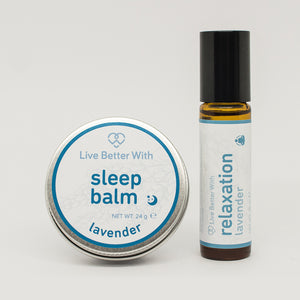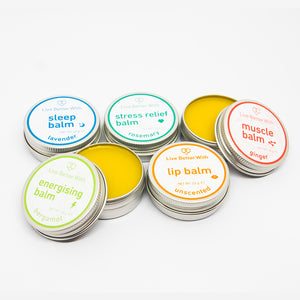Difficulty Sleeping and Fatigue
Difficulty Sleeping During the Menopause
During the menopause, many women find that they have trouble sleeping. Tossing and turning due to hot flushes and hot flashes or clammy night sweats can leave you feeling frustrated and fatigued. You might find that anxiety and tension prevent you from falling asleep comfortably in the first place.
Menopause-related insomnia is also debilitating and can result in further stress and greater mood swings during the day. If you’re going through the menopause and experiencing lots of sleepless nights, you’re not alone, and there are several products and strategies that can help you to get your sleep back on track.
This guide will cover:
- Night sweats
- Insomnia (supplements?)
- Anxiety and tension (sleep routine)
- Fatigue
Why do women find it hard to sleep during the menopause?
As oestrogen and progesterone levels fall, your body is less able to fall asleep or stay asleep. Fluctuating oestrogen levels can contribute to night sweats, something which is understandably disruptive to your sleep.
Oestrogen also controls levels of magnesium in the body. Magnesium helps your muscles to relax and can be important to sleep patterns as a result. Fluctuating oestrogen leads to variable levels of magnesium, and this can leave you lying awake!
Similarly, progesterone is partially responsible for helping your body to fall into deep sleep. As progesterone levels decrease, your body is less likely to enter a deep, restful period of sleep.
What are night sweats and why am I experiencing them?
Night sweats are simply hot flushes that take place at night - often when you are trying to sleep. Although night sweats can happen for other reasons, many women going through the menopause find that they become a regular - and unpleasant - occurrence.
- Wear bamboo: Bamboo fabric is highly breathable, hypoallergenic, and extremely soft. Bamboo pyjamas are a fabulous option if you’re experiencing night sweats during the menopause because they dry quickly and won’t leave you feeling damp, clammy or cold after a night sweat strikes. Bamboo will also keep you warm during the cooler months. It’s comfortable and cosy without being stifling or sweaty: the perfect antidote to night sweats.
- Cool down your bed and your room: We all know that the cold side of the pillow feels best - especially if you’re prone to night sweats and hot flushes. Try using a comfortable cooling mat to cool down your bed. Simply pop in the fridge and place under your pillow for instant, refreshing relief. You might also want to invest in a small fan or sleep with the windows open to keep your room cool.
- Try a cooling spritz: Cooling spritzes are a perfect way to instantly cool back down after an overwhelming night sweat strikes. This cooling spritz from Defiant Beauty is pleasantly refreshing. Keep it in the fridge for an extra boost!
How can I manage insomnia during the menopause?
Insomnia is a normal part of the menopause, but that doesn’t mean it’s easy to cope with! Wakefulness and poor rest are common, and many women find themselves lying awake at all hours of the night.
- Use a sleeping spritz: A lavender sleep spray is also a lovely way to prepare your bed for sleep. Simply spray a few spritzes onto your bed linen, pillow or pyjamas, and enjoy a more intense aromatherapeutic experience. If you do wake up in the night, try using a few spritzes of lavender spray to re-set your body and get back to sleep.
- Develop a sleep routine: If you’re experiencing insomnia, it’s a good idea to plan ahead. Do not use your bed for anything but sleeping, and refrain from eating or using your laptop for at least an hour before bed. It’s best not to try to go to sleep until your body is tired. You can also reduce your caffeine intake during the day, and try a bit of gentle exercise to naturally tire yourself out. Many women find that trying to stick to a regular schedule before bed is helpful: applying sleep balms, using a warming wrap, having a soothing or super-moisturising bath, and choosing comfortable pyjamas can all help your body and mind to prepare for rest.
- Make a plan for mid-night wakefulness: If you do wake up in the night, remember that lying awake in bed for hours on end is frustrating and will not help you to fall back asleep faster. Instead, move to a new space and engage your brain in a gentle, relaxing activity until you become sleepy again. Practicing some breathing exercises, or colouring in a colouring book are a perfect way to quiet your mind and get back to that sleepy feeling.
- Speak to your doctor about supplements: Some women find that their insomnia improves once they begin a regime of supplements. Herbal teas can also help to relax the body and mind.
How can I manage my anxiety for better sleep during the menopause?
Feelings of anxiety and tension can reduce your ability to become calm and fall asleep naturally. Here are some simple techniques for calming down and relaxing before bed:
- Use essential oils: Diffusing essential oils can help to encourage your body to fall asleep. A simple diffuser - or a diffuser-humidifier combination - can work wonders in creating a calming, peaceful environment. Choose lavender or chamomile scents and enjoy their soothing scent.
- Do some gentle breathing: Try exploring pranayama techniques and moving through a relaxing breathing routine. Your blood pressure will lower, and you’ll be better able to fall asleep.
What can I do about persistent menopause-related fatigue?
If you’re sleeping poorly, it’s understandable that you’ll probably feel tired and fatigued during the day. Dealing with fatigue is a fine balance between knowing when to rest, and knowing when to fuel your body.
- Exercise: It sounds counterintuitive but some gentle yoga or exercise can help to boost your body and give you more energy to get through the day. Go for a walk around the block, or move up and down the stairs a few times to re-energize.
- Take a short rest: Napping can have the opposite of its intended effect, making you more fatigued and uncomfortable. If you are going to rest, try to do so in as relaxed a state as possible, and make use of a warm lavender wrap to calm your body. You might also try using an eye mask and earplugs to block out light and sound.
- Try protein: If you’re looking for a boost, protein is a fantastic way to stabilize and heighten your energy levels. Try delicious protein balls on the go, or some protein bars between meals to get yourself through the day.
Sleeping well can be tricky at the best of times, so remember to be patient if you’re struggling to find the perfect combination of solutions.

